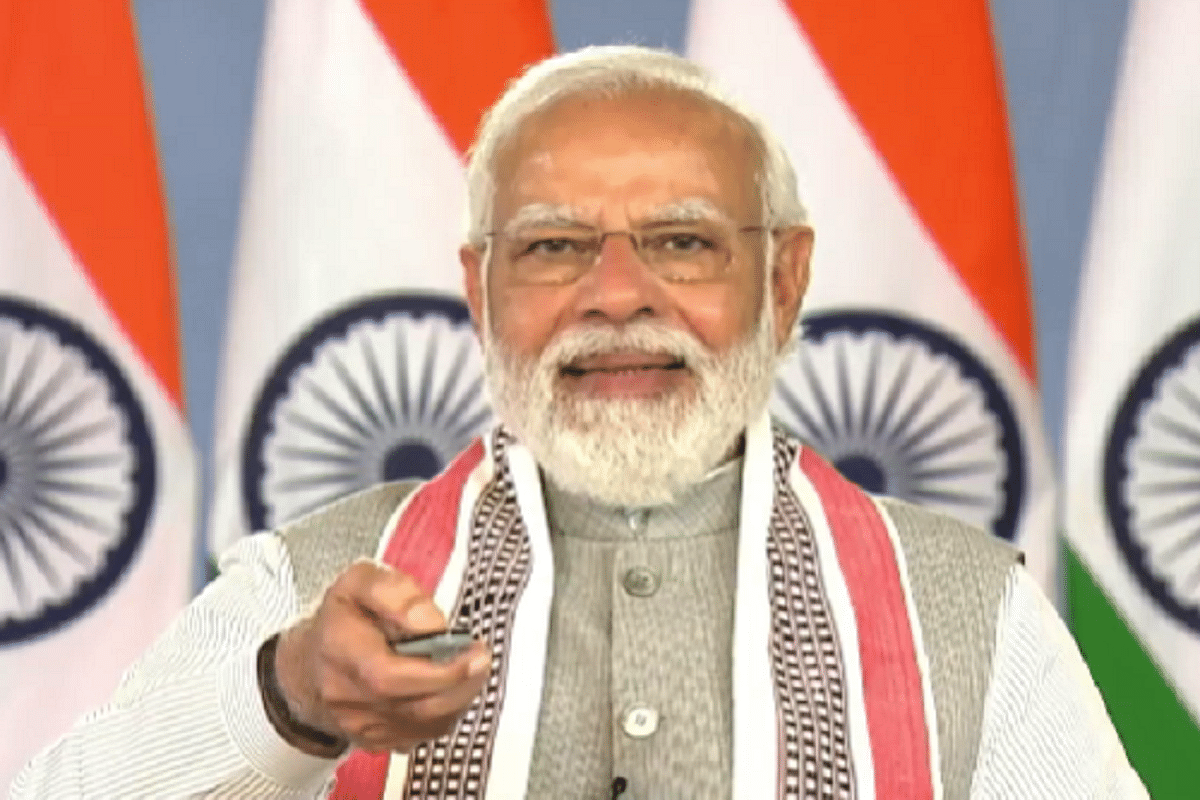Infrastructure
PM Modi To Flag Off Vande Bharat Express, Launch Projects Worth Over Rs 7,800 Crore In West Bengal Tomorrow

PM Modi (Pic Via Twitter)
Prime Minister Narendra Modi will be in West Bengal on Friday to launch development projects worth over Rs 7,800 crore in the state and flag off the Vande Bharat Express connecting Howrah and New Jalpaiguri.
PM Modi will also chair the second meeting of the National Ganga Council (NGC) in Kolkata.
He will flag off the Vande Bharat Express, connecting Howrah to New Jalpaiguri, at the Howrah Railway Station. The ultra-modern semi high speed train is equipped with state-of-the-art passenger amenities.
The train will stop at Malda Town, Barsoi and Kishanganj stations enroute on both the directions, the Prime Minister's Office (PMO) said in a release on Thursday (29 December).
PM Modi will also inaugurate the Joka-Taratala Stretch of Joka-Esplanade Metro Project (Purple Line). The 6.5-Km stretch having six stations namely Joka, Thakurpukur, Sakher Bazar, Behala Chowrasta, Behala Bazar and Taratala has been constructed at a cost of more than Rs 2,475 crore, the PMO said.
Passengers of southern parts of the Kolkata City like Sarsuna, Dakghar, Muchipara and South 24 Parganas will be immensely benefited by inauguration of this project, it added.
During the programme, Prime Minister will also dedicate four railway projects to the nation.
The railway projects include Boinchi-Shaktigarh third Line, developed at a cost of Rs 405 crore; Dankuni-Chandanpur fourth line project, developed at a cost of Rs 565 crore; Nimtita-New Farakka double line, developed at a cost of of Rs 254 crore; and Ambari Falakata-New Maynaguri-Gumanihat doubling project, developed at a cost of a cost of more than Rs 1,080 crore.
Prime Minister will also lay the foundation stone for redevelopment of New Jalpaiguri Railway Station, to be developed at a cost of more than Rs 335 crore, the PMO said.
In yet another step to boost Cooperative Federalism in the country, Prime Minister will chair the 2nd meeting of the National Ganga Council (NGC) on 30th December 2022 in Kolkata, the PMO said.
The meeting will be attended by Union Minister for Jal Shakti, other Union Ministers who are members of the council and Chief Ministers of Uttarakhand, Uttar Pradesh, Bihar, Jharkhand and West Bengal, it added.
The National Ganga Council has been given the overall responsibility for superintendence of pollution prevention and rejuvenation of River Ganga and its tributaries.
Prime Minister will inaugurate seven sewerage infrastructure projects (20 Sewage Treatment Plants and 612 km network) developed under National Mission for Clean Ganga (NMCG) at a cost of more than Rs 990 crore.
These projects will benefit municipalities of Nabadwip, Kacharapra, Halishar, Budge-Budge, Barrackpore, Chandan Nagar, Bansberia, Uttrapara Kotrung, Baidyabati, Bhadreshwar, Naihati, Garulia, Titagarh, and Panihati, the PMO said.
Together, these projects will add the sewage treatment capacity of over 200 MLD in the state of West Bengal.
He will also lay the foundation stone for five sewerage infrastructure projects (8 Sewage Treatment Plants and 80 Km Network) to be developed under National Mission for Clean Ganga (NMCG) at an estimated cost of Rs 1585 crore.
These projects will add 190 MLD new STP capacity in West Bengal and will benefit areas of North Barrackpore, Hooghly-Chinsura, Kolkata KMC area- Garden Reach & Adi Ganga (Tolly Nala) and Mahestala town.
PM Modi will also inaugurate Dr Syama Prasad Mookerjee – National Institute of Water and Sanitation (DSPM – NIWAS), which has been developed at Joka, Diamond Harbour Road, Kolkata at an estimated cost of around Rs 100 Crore.
The Institute will serve as an apex body in the country on water, sanitation and hygiene (WASH) in the country, serving as a hub of information and knowledge for Central, State and local governments, the PMO said.
Support Swarajya's 50 Ground Reports Project & Sponsor A Story
Every general election Swarajya does a 50 ground reports project.
Aimed only at serious readers and those who appreciate the nuances of political undercurrents, the project provides a sense of India's electoral landscape. As you know, these reports are produced after considerable investment of travel, time and effort on the ground.
This time too we've kicked off the project in style and have covered over 30 constituencies already. If you're someone who appreciates such work and have enjoyed our coverage please consider sponsoring a ground report for just Rs 2999 to Rs 19,999 - it goes a long way in helping us produce more quality reportage.
You can also back this project by becoming a subscriber for as little as Rs 999 - so do click on this links and choose a plan that suits you and back us.
Click below to contribute.
Latest